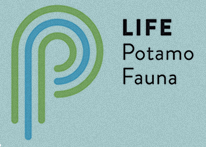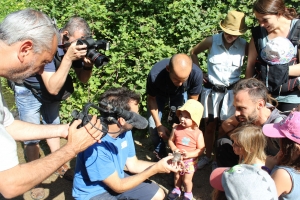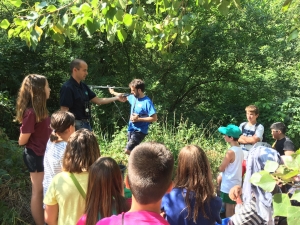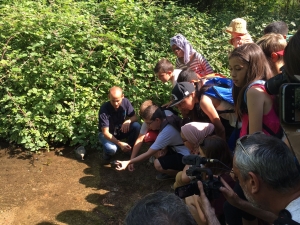This spring 40 European Pond Turtles raised in captivity have been released in the Ter river in order to recover this endangered species
Those reinforcements, provided from the project LIFE Potamo Fauna have been joined by the schools of Flaçà, Sant Jordi Desvalls and Vilopriu
In the framework of the European LIFE Potamo Fauna "Conservation of river fauna of Community interest in the Natura 2000 network sites of the Ter, Fluvià and Muga river basins" on May 26th both the Consorci del Ter and Consorci de l’Estany released several individuals of European Pond Turtles (Emys orbicularis) at the river Ter that had been bred in captivity. It took place at the municipalities of Flaçà and Sant Jordi Desvalls. The event was attended by a group of primary school children from the schools “Les Moreres” of Flaçà, from the school of Sant Jordi Desvalls, and and six kids from educational Center “Estels, Mare de dia” of Vilopriu. In May up to 40 turtles will be released up in different parts of the Natura 2000 network area, “Banks of the Lower Ter”. These are in addition to 120 already released in the past two years under the same project between Anglès and Foixà. One of the goals of LIFE Potamo Fauna is to release at least 150 individuals of Pond Turtle in space Natura 2000 network “Banks of the Lower Ter (ES5120011)”. The result is even better, with a total of 160 new European Pond Turtles in the river Ter.
Once released a regular monitoring is done, since all turtles are marked with a subcutaneous chip to facilitate individual identification and long-term monitoring. Also, four of the turtles released each year carry a transmitter to track through radiotraking techniques to know about their habitat and survival. The turtles released in previous years, a total of 32, they also had this device.
On the previous years 2015 and 2016, with the aim of creating a suitable habitat for the European Pond Turtles and other species of reptiles and amphibians of European interest, the Consorci del Ter had created several temporary ponds, a habitat known as “Mediterranean temporary ponds” (3170* -Annex I of the Habitats Directive) in various areas of the municipality of Anglès, Bescanó and Sant Gregori, as well as in the area of “l’Illa” in Flaçà. This type of habitat is gradually disappearing by progressive consolidation into a single channel or river arm increasingly narrow and mostly running water habitat.
The production of young European Pond Turtles was done at the Centre de Reproducció de Tortugues de l’Albera (CRT) in Garriguella. Indeed, under the LIFE Potamo Fauna in July 2014 that Center built 31 new breeding ponds to have more space and better conditions for initiating a renewed breeding program in captivity.
The lower basin of the River Ter is one of the last enclaves of the European Pond Turtle in Catalonia. However, the strong decline observed over the past decades has led the species to a precarious situation that doesn’t suggest a spontaneous recovery of the residual population that currently holds the ZEC area “Banks of the Lower Ter”.
A part of the European Pond Turtles, LIFE Potamo Fauna preserves other endangered species as the Naiad Unio elongatulus, the White-clawed Crayfish (Austropotamobius pallipes), Mediterranean Barbel (Barbus meridionalis), the small snails such as Vertigo moulinsiana and Vertigo angustior, and also the Mediterranean Turtle (Mauremys leprosa) and various amphibians. It also fights against various alien invasive species and holds awareness campaigns on the river fauna threatened.
The whole project has a budget of 1,900,262 euros, 50% funded by the European Union. Over the four-year (2014-2017) is planning to invest 124,761 euros (6.6% of the budget) in actions to recover populations of European Pond Turtle Natura 2000 Girona.
LIFE Potamo Fauna executed and coordinated by the Consorci de l’Estany works in conjunction with Consorci del Ter, the Department of Territori i Sostenibilitat, Forestal Catalana, els Amics de la Tortuga de l’Albera, the Universidad del País Vasco, and with the financial participation of the Diputació de Girona, the Ajuntament de Banyoles, the Ajuntament de Porqueres, the Consorci Esportiu de Banyoles and also Aigües de Banyoles.



















